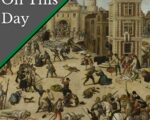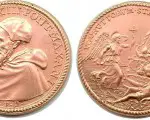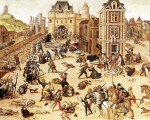Primary source accounts of the 1572 St Bartholomew’s Day Massacre.
Eye witness account, written by historian Jacques Auguste de Thou:
So it was determined to exterminate all the Protestants and the plan was approved by the queen. They discussed for some time whether they should make an exception of the king of Navarre and the prince of Condé. All agreed that the king of Navarre should be spared by reason of the royal dignity and the new alliance. The duke of Guise, who was put in full command of the enterprise, summoned by night several captains of the Catholic Swiss mercenaries from the five little cantons, and some commanders of French companies, and told them that it was the will of the king that, according to God’s will, they should take vengeance on the band of rebels while they had the beasts in the toils. Victory was easy and the booty great and to be obtained without danger. The signal to commence the massacre should be given by the bell of the palace, and the marks by which they should recognize each other in the darkness were a bit of white linen tied around the left arm and a white cross on the hat.
[Read More...]





